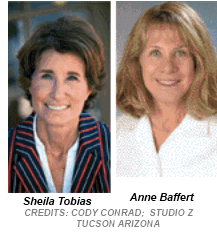|
News & Views item - May 2012 |
![]() A Plea for Support for Pre-University Science Teachers. (May 4, 2012)
A Plea for Support for Pre-University Science Teachers. (May 4, 2012)
Science's Editor-in-Chief, Bruce Alberts, this week turned over the journal's editorial page to "Empowering Science Teachers" as advocated by Sheila Tobias who writes about maths and science education from an outsider's viewpoint and Anne Baffert a chemistry teacher at Salpointe Catholic High School, Tucson, AZ.

To change the widespread lack of understanding and appreciation for science in the United States, it is critical to pinpoint the major source of the problem, so state this week's editorialists, and while the overall attitude toward science and mathematics in Australia may not be nearly so negative as it is in much of the United States' population, what Tobias and Baffert have to say has relevance.
And as others have done, they hold up Finland and the Finns as an object lesson:
Finland attracts and retains the best and the brightest to precollege teaching careers. There are 10 applicants for every teaching post in that country, corresponding to a 1-in-10 acceptance rate into teacher training programs.* In 1994, Finland established a Teacher Researcher Network to connect college education research faculty and precollege teachers, and to involve classroom teachers directly in education research. Finnish precollege teachers thereby become equipped to formulate changes in curricula.† This not only empowers classroom teachers but also appropriately treats them as education experts, further raising their social status.
[But in the United States] Too many precollege teachers work in a “command-and-control” environment, managed by those who lack any real understanding of how to improve the system. Yet the teachers who know how to make improvements are rarely empowered to do so. It is not surprising that an annual poll of U.S. teachers found that only 44% were “very satisfied” with their jobs in 2011, the lowest level recorded in the survey's 28-year history.‡ ...We recommend that school districts select outstanding teachers to serve on a Science Teacher Council.
Tobias and Baffert consider that: "Science teachers' professionalism also rests on their continual active involvement in science through structured collaborations with scientists" and site model programs such as the California State University's Science Teacher and Researcher Program# "where teachers partner with researchers in academic or industrial settings [and] teachers often co-author papers with their research colleagues and present findings at scientific meetings."
And finally: "Education would certainly fit the bill if the United States, like Finland, treated teachers as real professionals".
Undoubtedly the same can be said for Australia, but in fact Australia is in a far better position to implement Tobias and Baffert's recommendations were our federal and state governments to exercise the will to do so rather than largely paying it lip service.
________________________________________________
† https://www.jyu.fi/edu/laitokset/okl/tutkivaopettaja/teacherresearcher.
# See for example http://education.llnl.gov/star/